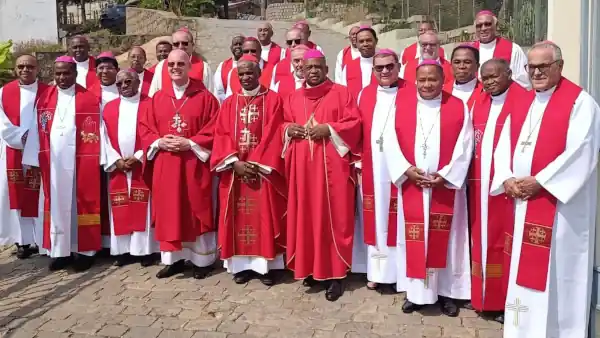05 June - Boniface was born in Crediton, Wessex, and was christened Winfrid (or Wynfrith) at his baptism. He was from a good family and was admitted as an Oblate to the monastery of Exeter. A brilliant student, he was sent to the monastery of Nursling, renowned for the quality of its teaching. He became a priest at the age of thirty.
In 715, he made a missionary trip to Friesland to convert the pagans of northern Europe by preaching in their own idiom, his own Anglo-Saxon language resembling the old Friesian, but his efforts were thwarted by the war between Charles Martel and Radbod, king of the Friesians. In 716, he met a monk at Wenlock Abbey who told him about his vision of the afterlife. Boniface hastened to put it in writing, which can be read in Boniface's letters.
In 718, Saint Boniface visited Rome and was commissioned by Pope Gregory II (who made him bishop, giving him the name of the saint of the day: Boniface) to reorganize the Church in Germany and evangelize the pagans there. For five years, he travelled through Thuringia (his presence is attested in 724 at the castle of Altenstein), Hesse and Friesland, then returned to Rome to report on his success. During this visit, the pope made him archbishop. He returned to Germany, and as envoy of the sovereign pontiff, baptized thousands of pagans. He also dealt with the problems of many Christians who had lost contact with the hierarchy of the Catholic Church.
After another visit to Rome in 738, he returned to Bavaria, where he founded the bishoprics of Salzburg, Regensburg, Freising and Passau. In 744, one of his main disciples, Sturm, founded the Abbey of Fulda, not far from the monastery of Fritzlar founded by Boniface. Although Sturm was the founder, Boniface was very much involved. The initial financing of the abbey was provided by Carloman, the son of Charles Martel. The support of the mayors of the palace and later of the first Pippinides and Carolingian kings played an important part in the success of Saint Boniface. Nevertheless, he managed to find a balance between their support and that of the Papacy and the Bavarian Agilolfings, thus ensuring a certain independence in his actions.
After his return to Bavaria, Boniface resumed his missions in Saxony. He founded the dioceses of Würzburg, Erfurt and Büraburg (later Fritzlar). By appointing his own followers as bishops, he was able to maintain a certain independence from the Carolingian power. He also organized provincial synods in the Frankish Church, and maintained a sometimes troubled relationship with the Frankish king Pepin the Short, whom he crowned at Soissons in 751 and sacked in March of the following year. He also continued to deal with certain internal affairs in his home country, notably by sending a long letter of reprimand in 746 to King Æthelbald of Mercia, whose sexual morals seemed to him to be a bad example for peoples not yet Christianized. Æthelbald is also mentioned in another letter from Boniface, letter 115, in which the vision of a monk who had seen the king in the afterlife is recounted.
He never gave up his hope of converting the Friesians. In 750, he appointed his disciple, the future Saint Gregory, abbot of the Abbey of St. Martin in Utrecht, and took him on to help him in the administration of the diocese of Utrecht, the least Christianised part of his vast field of apostolate. He stayed in Friesland for quite a long time, and in 754 baptized many inhabitants of this still largely pagan region.
Saint Boniface was one of the initiators of the Carolingian renaissance. We also owe him a treatise on grammar. He strove to reform the Church and give it a new lease of life in an era when religion risked becoming the instrument of those in power. Disappointed by the opposition of the bishops and by the weakness of the aristocracy who would have liked to maintain the status quo, Saint Boniface gave up and in 753 asked permission to return to Friesland, his first place of evangelisation. Carloman, very much influenced by the personality of Saint Boniface, had already abandoned the provinces bequeathed by his father Charles Martel to his brother Pepin le Bref to retire to the Abbey of Mont-Cassin south of Rome in 747.
On June 5, 754, Saint Boniface, then over 70 years of age, was murdered with fifty-two companions by pagans, probably at Dokkum in Friesland (Netherlands) on the banks of the river Born.








